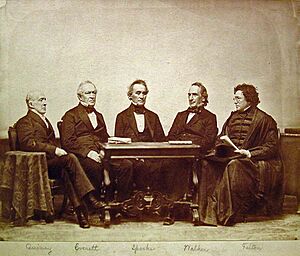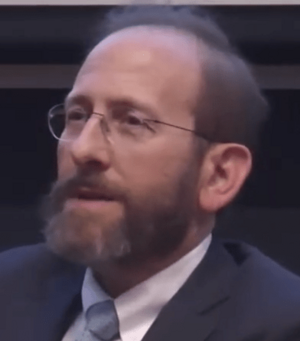President of Harvard University facts for kids
Quick facts for kids President of Harvard University |
|
|---|---|
| Appointer | Harvard Corporation |
| Formation | 1640 |
| First holder | Henry Dunster |
The president of Harvard University is the main leader of Harvard University. This person also serves as the president of the Harvard Corporation. The other members of the Corporation choose the president. They trust the president to manage the university every day.
Harvard's current president is Alan Garber. He started his role on January 2, 2024. He took over after Claudine Gay resigned.
Contents
What the President Does
The president helps plan the future of Harvard University. They make important decisions about the university's direction. The president chooses the leaders, called deans, for different parts of the university. They also pick the university's provost, a top academic officer.
The president also decides which professors get tenure. This means professors get a permanent job. However, the president talks a lot with professors before making these big choices.
Lately, the president's job has become more about managing things. A big part of the job is now raising money for the university. Some people think this takes away from focusing on education.
Each president is also a professor. They sometimes teach classes at the university. Harvard provides a special house for the president to live in. From 1912 to 1971, it was President's House. Since then, it has been Elmwood.
How Presidents Have Influenced Education

Harvard presidents have often changed how education works across the United States. For example, Charles W. Eliot created the idea of students choosing their own courses. This is common in many schools today.
James B. Conant helped bring in standardized tests. These tests are used to compare students' knowledge. Later, Derek Bok and Neil L. Rudenstine spoke about the importance of having many different kinds of students at universities. They believed in diversity in higher education.
History of Harvard's Leaders
When Harvard was first started, its leader was called a "schoolmaster." Nathaniel Eaton was the first. In 1640, Henry Dunster became the leader and was called "president."
Harvard was first created to train Puritan religious leaders. Because of this, most presidents until the late 1700s were religious figures.
Most presidents from 1672 to 1971 had graduated from Harvard College. After 1971, almost all presidents earned a graduate degree from Harvard. The only exception was Drew Gilpin Faust. She was the first president since the 1600s who did not have a degree from Harvard.
Presidents of Harvard
| No. | Image | Presidents | Term of office | Length | Notes |
|---|---|---|---|---|---|
| – | Nathaniel Eaton | 1637–1639 | 2 years | Called "schoolmaster" of Harvard College Removed from his position due to serious issues. |
|
| 1 | Henry Dunster | 1640–1654 | 14 years, 1 month and 27 days | Left his role due to disagreements about religious practices. | |
| 2 |  |
Charles Chauncy | 1654–1672 | 17 years, 3 months and 17 days | Died while in office. |
| 3 | Leonard Hoar | 1672–1675 | 2 years, 3 months and 5 days | Asked to resign. | |
| 4 |  |
Urian Oakes | 1675–1680 (acting); 1680–1681 | 6 years, 3 months and 18 days (total);
4 years, 9 months and 26 days (acting); 1 year, 5 months and 23 days |
Died while in office. |
| 5 |  |
John Rogers | 1682–1684 | 2 years, 3 months and 2 days | Died while in office. |
| 6 |  |
Increase Mather | 1685–1686 (acting); 1686–1692 (rector); 1692–1701 | 16 years and 18 days (total); 1 year and 12 days (acting); 6 years and 4 days (rector); 9 years and 2 days | Asked to resign. |
| – |  |
Samuel Willard | 1701–1707 (acting) | 6 years and 6 days | Resigned due to illness. |
| 7 |  |
John Leverett | 1708–1724 | 16 years, 3 months and 19 days | First lawyer to be president. Died while in office. |
| 8 |  |
Benjamin Wadsworth | 1725–1737 | 11 years, 8 months and 9 days | Died while in office. |
| 9 |  |
Edward Holyoke | 1737–1769 | 32 years | At 79, he was the oldest president. Died while in office. |
| – |  |
John Winthrop | 1769 (acting) | Did not want to be president permanently because of his age. | |
| 10 | Samuel Locke | 1770–1773 | 3 years, 6 months and 10 days | Resigned due to personal reasons. | |
| – |  |
John Winthrop | 1773–1774 (acting) | Again, did not want to be president permanently because of his age. | |
| 11 | Samuel Langdon | 1774–1780 | 6 years, 1 month and 12 days | Students asked for his removal, and he resigned. | |
| – |  |
Edward Wigglesworth | 1780–1781 (acting) | ||
| 12 |  |
Joseph Willard | 1781–1804 | 23 years and 20 days | Died while in office. |
| – |  |
Eliphalet Pearson | 1804–1806 (acting) | Served as acting president after Willard's death. | |
| 13 | Samuel Webber | 1806–1810 | 4 years, 2 months and 11 days | Died while in office. | |
| – |  |
Henry Ware | 1810 (acting) | Served as acting president after Webber's death. | |
| 14 |  |
John Thornton Kirkland | 1810–1828 | 17 years, 4 months and 19 days | Resigned due to health issues and concerns about how money was managed. |
| – |  |
Henry Ware | 1828-1829 (acting) | Served as acting president after Kirkland resigned. | |
| 15 |  |
Josiah Quincy III | 1829–1845 | 16 years, 6 months and 29 days | Retired from his position. |
| 16 |  |
Edward Everett | 1846–1848 | 2 years, 11 months and 27 days | Resigned because he was not happy with the job. Later became a Secretary of State and a Senator. |
| 17 |  |
Jared Sparks | 1849–1853 | 4 years and 9 days | Resigned because he was not happy with the job. |
| 18 |  |
James Walker | 1853–1860 | 6 years, 11 months and 16 days | Resigned due to arthritis. |
| 19 |  |
Cornelius Conway Felton | 1860–1862 | 2 years and 10 days | Died from a heart disease while traveling. |
| – |  |
Andrew Preston Peabody | 1862 (acting) | Served as acting president after Felton's death. | |
| 20 |  |
Thomas Hill | 1862–1868 | 5 years, 11 months and 24 days | Resigned due to poor health. |
| – |  |
Andrew Preston Peabody | 1868-1869 (acting) | Served as acting president after Hill resigned due to illness. | |
| 21 |  |
Charles William Eliot | 1869–1909 | 40 years, 2 months and 7 days | At 35, he was the youngest president. He served the longest term (40 years). |
| 22 |  |
A. Lawrence Lowell | 1909–1933 | 24 years, 1 month and 2 days | Retired from his position. |
| 23 |  |
James B. Conant | 1933–1953 | 19 years, 6 months and 22 days | Retired to become a high commissioner and later an ambassador for the U.S. |
| 24 |  |
Nathan Pusey | 1953–1971 | 18 years and 29 days | He called the police during a student protest in 1969. He was criticized for this and announced his retirement in 1970. |
| 25 | Derek Bok | 1971–1991 | 19 years, 11 months and 29 days | Henry Rosovsky served as acting president when Bok was away. | |
| 26 | Neil Rudenstine | 1991–2001 | 9 years, 11 months and 29 days | Provost Albert Carnesale was acting president for three months when Rudenstine was on medical leave. | |
| 27 |  |
Lawrence Summers | 2001–2006 | 4 years, 11 months and 29 days | First Jewish president. He had the shortest time in office since the Civil War. He resigned after disagreements with professors. |
| – | Derek Bok | 2006–2007 (interim) | 11 months and 29 days | Served as acting president after Summers resigned. | |
| 28 |  |
Drew Gilpin Faust | 2007–2018 | 10 years, 11 months and 29 days | First female president. |
| 29 |  |
Lawrence Bacow | 2018–2023 | 4 years, 11 months and 29 days | Retired from his position. |
| 30 |  |
Claudine Gay | 2023–2024 | 6 months and 1 day | She was the shortest serving president. She resigned after facing challenges and questions about her past work. She was the first Black president. |
| 31 |  |
Alan Garber | 2024–Present | 2 years and 2 months | He was first appointed as interim president after Gay's resignation. He was then permanently appointed as the 31st president until 2027. |


